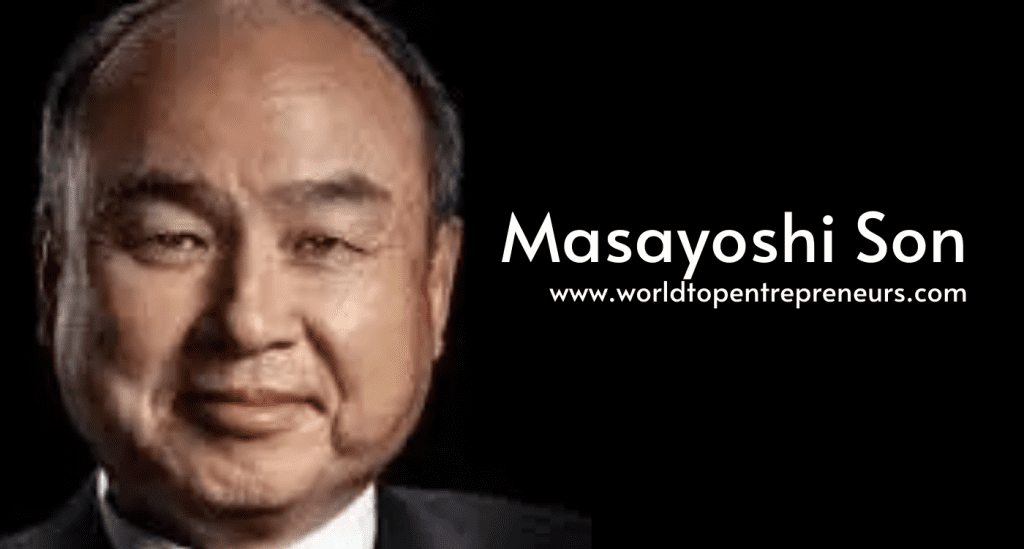Introduction
In the fast-evolving world of telecommunications and information technology, few figures stand out with as much impact and innovation as Masayoshi Son. As the founder and CEO of SoftBank Group, Son’s visionary leadership has reshaped the global landscape of technology, investment, and telecommunications. From a small startup to a multi-billion-dollar conglomerate, SoftBank’s journey under Son’s stewardship is a testament to his remarkable foresight, resilience, and bold strategies. This article explores the life and achievements of Masayoshi Son, delving into his journey from humble beginnings to becoming a titan in the tech world.
Early Life and Background
Masayoshi Son was born on August 11, 1957, in Tosu, Saga Prefecture, Japan. Growing up in a modest household, Son’s early life was marked by a blend of traditional values and a keen sense of ambition. His parents, who had emigrated from Korea to Japan, instilled in him the importance of hard work and perseverance. Son’s formative years were influenced by a blend of cultural experiences and a growing curiosity about the rapidly advancing world of technology.
From a young age, Son exhibited a remarkable aptitude for business and technology. He was known for his entrepreneurial spirit, often coming up with creative ideas and ventures. This early inclination towards business was complemented by a fascination with computing and telecommunications, laying the foundation for his future endeavors. Son’s academic journey took him to the University of California, Berkeley, where he pursued a degree in economics. It was during this time that he was exposed to the cutting-edge technology and entrepreneurial culture of Silicon Valley, which profoundly influenced his vision for the future.
The Birth of SoftBank
In 1981, Masayoshi Son founded SoftBank, initially established as a software distributor. The company’s early focus was on selling software products, particularly for personal computers. Son’s vision was to create a company that could leverage the burgeoning technology sector and capitalize on emerging trends in computing and telecommunications. His early successes in software distribution provided the foundation for SoftBank’s growth and expansion.
SoftBank’s breakthrough came in 1994 when the company made a strategic move into the telecommunications sector. Recognizing the potential of the internet and wireless communication, Son decided to shift SoftBank’s focus towards these emerging areas. This pivot was driven by Son’s belief in the transformative power of technology and his commitment to staying ahead of the curve.
One of the key milestones in SoftBank’s early history was the acquisition of Ziff-Davis, a leading technology and media company. This acquisition provided SoftBank with a significant foothold in the technology sector and helped establish the company as a major player in the industry. The move also marked the beginning of SoftBank’s expansion into global markets, setting the stage for its future growth and success.
Visionary Investments and Expansion
Under Masayoshi Son’s leadership, SoftBank embarked on a series of ambitious investments and acquisitions that would redefine the company’s trajectory. Son’s approach to investment was characterized by a willingness to take bold risks and a long-term vision for transforming industries.
One of SoftBank’s most notable investments was in Alibaba Group, a Chinese e-commerce giant founded by Jack Ma. In 2000, SoftBank invested $20 million in Alibaba, which was a relatively small sum at the time. However, this investment would prove to be a game-changer for SoftBank, as Alibaba’s rapid growth and success resulted in significant returns for the company. The investment in Alibaba not only bolstered SoftBank’s financial position but also underscored Son’s ability to identify and capitalize on high-potential opportunities.
In addition to Alibaba, SoftBank made strategic investments in a range of technology and telecommunications companies. These investments included stakes in companies such as Sprint, ARM Holdings, and Yahoo Japan. Son’s strategy of diversifying SoftBank’s portfolio and investing in cutting-edge technologies helped position the company as a global leader in telecommunications and IT.
One of SoftBank’s most ambitious ventures was the creation of the SoftBank Vision Fund, launched in 2017. The Vision Fund was established with a $100 billion investment fund, aimed at investing in technology companies with the potential for transformative impact. The fund’s investments spanned various sectors, including artificial intelligence, robotics, and autonomous vehicles. The Vision Fund represented Son’s commitment to shaping the future of technology and driving innovation on a global scale.
Challenges and Resilience
Masayoshi Son’s journey with SoftBank has not been without challenges. The technology and telecommunications sectors are highly competitive and subject to rapid change, requiring constant adaptation and resilience. Son’s ability to navigate these challenges and maintain SoftBank’s growth trajectory is a testament to his strategic acumen and determination.
One of the significant challenges SoftBank faced was the acquisition of Sprint, a major U.S. telecommunications company. Acquired in 2013, Sprint was a critical component of SoftBank’s strategy to expand its presence in the U.S. market. However, Sprint faced several operational and financial difficulties, including intense competition and regulatory hurdles. Son’s approach to addressing these challenges involved a combination of restructuring efforts, strategic partnerships, and a focus on improving Sprint’s operational efficiency.
Another challenge for SoftBank was managing the complexities of the Vision Fund’s investments. The Vision Fund’s focus on high-risk, high-reward investments required careful oversight and strategic decision-making. SoftBank faced challenges related to the performance of some of its portfolio companies, leading to scrutiny and adjustments in its investment strategy. Son’s ability to adapt to these challenges and make necessary adjustments highlighted his resilience and commitment to achieving long-term success.
Despite these challenges, Masayoshi Son’s leadership and strategic vision have played a crucial role in SoftBank’s continued success. His ability to navigate obstacles, make bold decisions, and stay focused on long-term goals has been instrumental in maintaining the company’s position as a global leader in telecommunications and technology.
Legacy and Impact
Masayoshi Son’s legacy is defined by his transformative impact on the technology and telecommunications sectors. His visionary leadership and strategic investments have reshaped industries and set new standards for innovation and growth. SoftBank’s success under Son’s stewardship is a testament to his ability to identify and capitalize on emerging trends, drive technological advancement, and create value for stakeholders.
One of Son’s most significant contributions is his role in fostering innovation and driving technological progress. Through SoftBank’s investments in companies such as Alibaba, ARM Holdings, and various startups, Son has played a key role in advancing technologies such as e-commerce, semiconductors, and artificial intelligence. His commitment to supporting groundbreaking technologies has helped shape the future of the tech industry and create new opportunities for growth and development.
Son’s influence extends beyond SoftBank’s achievements. His work has inspired a new generation of entrepreneurs and investors to pursue bold ideas and embrace the potential of technology. The success of the Vision Fund and SoftBank’s other ventures serves as a reminder of the power of vision, risk-taking, and innovation in achieving extraordinary results.
In addition to his professional accomplishments, Masayoshi Son is also recognized for his contributions to philanthropy and social responsibility. SoftBank has supported various initiatives aimed at addressing global challenges, including disaster relief efforts, education, and environmental sustainability. Son’s commitment to using technology and resources for positive impact reflects a broader understanding of the role of business in addressing societal issues.
Personal Reflections and Philosophy
Masayoshi Son’s approach to business and technology is deeply rooted in his personal philosophy and values. He is known for his unwavering dedication to his vision, his focus on long-term goals, and his belief in the transformative power of technology. Son’s leadership style is characterized by a combination of strategic foresight, hands-on involvement, and a commitment to nurturing innovation.
Son’s personal reflections on success and challenges reveal a thoughtful and resilient individual. He is known for his ability to stay focused on his long-term vision while navigating the complexities of the technology industry. Son’s journey with SoftBank has been marked by both triumphs and setbacks, but his commitment to innovation and growth has remained a constant driving force.
One of Son’s key philosophies is the belief in the potential of technology to drive positive change. He has consistently emphasized the importance of investing in technologies that have the potential to address global challenges and create meaningful impact. This philosophy is reflected in SoftBank’s investments in areas such as artificial intelligence, renewable energy, and healthcare.
Conclusion
Masayoshi Son’s story is one of visionary leadership and transformative impact in the world of telecommunications and technology. As the founder and CEO of SoftBank Group, Son has played a pivotal role in reshaping industries, driving innovation, and creating value on a global scale. His contributions to the technology sector, his ability to navigate challenges, and his commitment to supporting groundbreaking technologies have solidified his reputation as one of the most influential figures in the tech world.
Son’s legacy is reflected in the continued success of SoftBank and the enduring impact of his investments and initiatives. His visionary approach, strategic acumen, and dedication to technological advancement have inspired a new generation of entrepreneurs and investors. As we look back on Masayoshi Son’s achievements and the evolution of SoftBank, it is clear that his contributions have set a standard for excellence in the technology and telecommunications sectors and will continue to shape the future of innovation and growth.





















